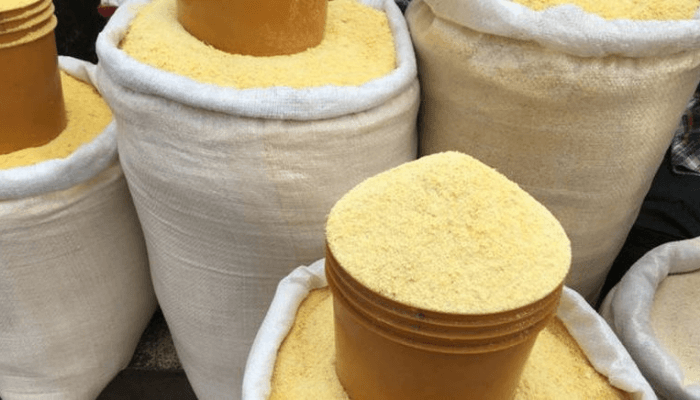Business
Garri: How Nigeria’s Staple Food Became Unaffordable
By Benjamin Abioye

Once the food of the common man in Nigeria, the price of garri has transformed it into a scarce commodity for many.
The surge in the price of garri in Nigeria, especially in 2024, has reached alarming levels, leaving many Nigerians bewildered and distressed.
Garri, once the most affordable staple for the common Nigerian, has now escalated in price to the point of being considered as valuable as gold across Nigeria. Its current price matches that of rice in 2023, symbolizing a dramatic shift in the affordability of essential food items.
Historically, garri was a supplementary food item, often consumed after the main meal. However, it has now become the primary sustenance for entire families. Rice and beans have turned into luxury items beyond the reach of many Nigerians.
Garri flour is known for its versatility and ease of preparation. When cooked with hot water, it transforms into “eba,” a dish commonly enjoyed with a variety of soups and stews. Alternatively, it can be soaked in cold or room temperature water and consumed with groundnut, sugar, or milk.
Recent market surveys reveal a startling increase in garri prices. A mudu (a local measure) of garri (both white and yellow) is now sold for between N1,100 and N1,500, while a bag costs between N70,000 and N90,000. In some states, a mudu of white garri is priced at N1,200, and yellow garri ranges from N1,300 to N1,400. A bag of white or yellow garri sells for between N70,000 and N82,000. In other regions, a mudu of white garri is N1,000, with a bag priced between N52,000 and N53,000. In yet other states, a bag of garri reaches up to N80,000.
The pressing question is: How did we arrive at this point?
Some sellers blame the high cost of transportation to the market, while transporters complain about bad roads and the high cost of spare parts. Others blame the insecurity in the country, citing constant attacks on farmers by herdsmen. The few farmers who manage to farm are said to take advantage of the situation to sell at higher prices.
Farmers also point to a lack of governmental support as a major factor. The absence of financial assistance for large-scale mechanized farming and inadequate provision of essential farming inputs like fertilizers have hindered production capacity.
The volatile exchange rate between the Dollar and the Naira further compounds the problem. While some argue that garri, being locally produced from cassava, should not be affected by the exchange rate, the reality is that the overall economic instability influences all sectors, including agriculture.
A recent incident in Ilorin shows the tension within the market. A group of market women confronted a colleague who was selling garri at a lower price than the prevailing rate. Accused of undercutting her peers, who sold garri for 1,300-1,500 naira, the woman faced backlash for her attempt to offer more affordable prices.
This situation highlights a deeper issue of internal discord and a lack of collective responsibility. It suggests that the solution extends beyond government intervention; it requires a change in the mindset and practices of the people themselves.
To address the escalating prices of garri and other essential commodities, a multifaceted approach is necessary. Citizens must cultivate a sense of fairness and avoid exploiting the current economic hardships. Simultaneously, the government must prioritize economic revitalization, enhance security for farmers, and provide substantial support for large-scale mechanized farming.
GWG.ng reports experts as saying that improving road infrastructure is crucial to facilitating the smooth transportation of goods, reducing costs and preventing further price hikes. Additionally, implementing effective price control mechanisms can help stabilize the market and make essential commodities more affordable.
Send Us A Press Statement Advertise With Us Contact
And For More Nigerian News Visit GWG.NG